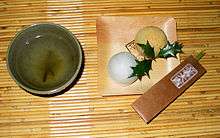Kelp tea
Kelp tea is a traditional East Asian tea made by infusing kelp in hot water.[1] It is called kobu-cha or konbu-cha (昆布茶) in Japan, haidai-cha (海带茶) in China and dasima-cha (다시마차) in Korea.
 Japanese kobu-cha | |
| Type | Herbal tea |
|---|---|
| Country of origin | Japan, China, Korea |
| Region of origin | East Asia |
| Ingredients | Kelp |
| Korean name | |
| Hangul | 다시마차 |
|---|---|
| Hanja | ---茶 |
| Revised Romanization | dasima-cha |
| McCune–Reischauer | tasima-ch'a |
| IPA | [ta.ɕi.ma.tɕʰa] |
| Chinese name | |||||||
|---|---|---|---|---|---|---|---|
| Simplified Chinese | 海带茶 | ||||||
| Traditional Chinese | 海帶茶 | ||||||
| |||||||
Preparation
Korea
Either dried kelp powder, or julienned kelp can be used to make the tea.[1]
Powdered tea can be made by pan-frying and pounding cleaned and dried kelp.[2] For a cup of hot water, two to three spoons of kelp powder is used.[2] Optionally, sugar or honey can be added.[2]
Alternatively, around 30 grams (1.1 oz) of cleaned kelp pieces are infused in 300–500 millilitres (11–18 imp fl oz; 10–17 US fl oz) of hot water.[3] The kelp slices are removed after infusing, and salt is added to taste.[3]
gollark: Time travel seems pretty hard to reason about for our operating-in-linear-time brains.
gollark: I have never heard anyone use slyce or, well, anything but bit, byte and occasionally nybble before.
gollark: Flip-flop things not implemented on top of other gates would be stateful, wouldn't they?
gollark: SRAM cells need power constantly or they lose data.
gollark: Flash memory is also implemented in silicon and does nonvolatile storage using some black magic with a weird type of transistor.
References
- "Dasima-cha" 다시마차. Standard Korean Language Dictionary (in Korean). National Institute of Korean Language. Retrieved 24 July 2017.
- 정, 동효; 윤, 백현; 이, 영희, eds. (2012). "다시마차의 건강기능 효과". Cha saenghwal munhwa daejeon 차생활문화대전 (in Korean). Seoul: Hongikjae. ISBN 9788971433515. Retrieved 24 July 2017 – via Naver.
- "Dasima-cha" 다시마차. Doopedia (in Korean). Doosan Corporation. Retrieved 24 July 2017.
This article is issued from Wikipedia. The text is licensed under Creative Commons - Attribution - Sharealike. Additional terms may apply for the media files.